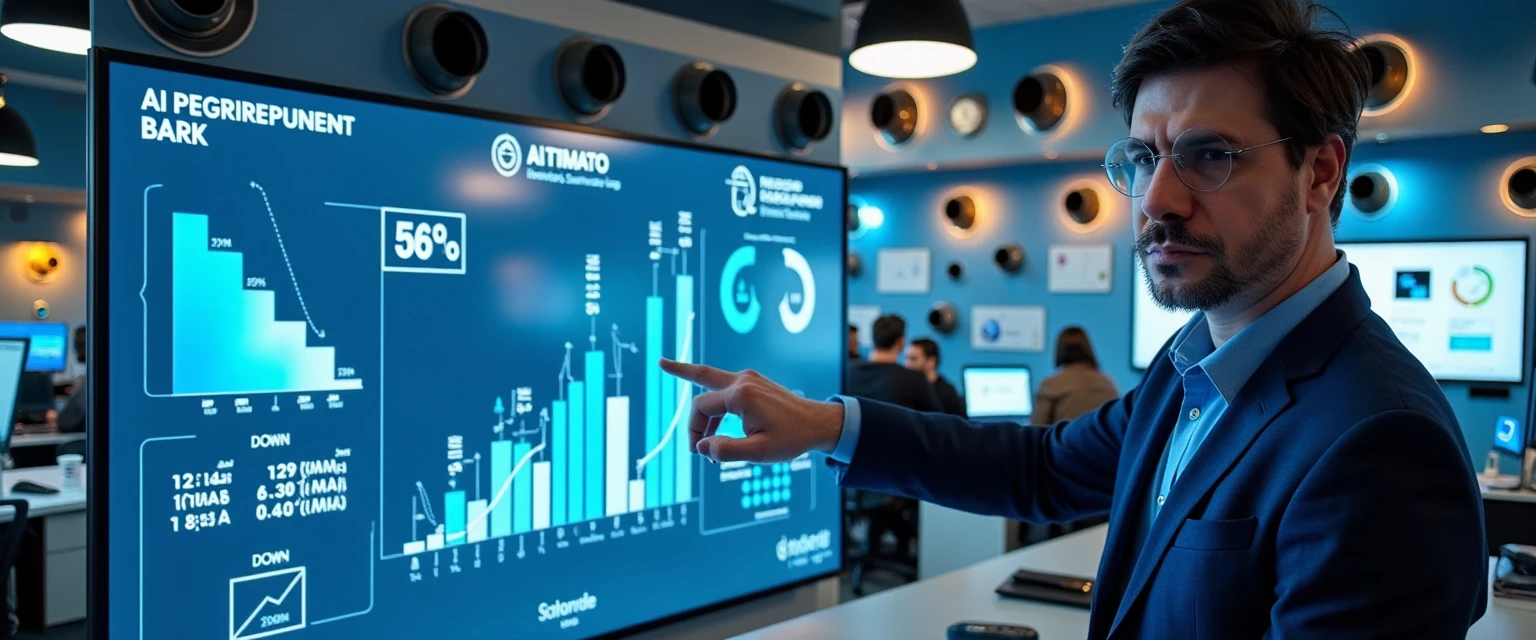AI Radar: From False Automation to the Reality of 31 Million Jobs Impacted — The Brazilian Panorama in 24h
June 3, 2025 | by Matos AI

The world of artificial intelligence continues to accelerate, with developments that alternately inspire us and make us question the ethical limits of technology. The last 24 hours have brought alarming revelations and promising opportunities that deserve careful analysis. Follow me as I follow the main developments and their implications for the Brazilian innovation ecosystem.
The Dark Side of Innovation: When Marketing Overtakes Reality
We begin with a case that serves as a warning to the entire ecosystem. The British startup Builder.ai, which presented itself as an AI-based automation platform, recently announced plans to go bankrupt after a fraudulent scheme was discovered. According to Bloomberg investigation, the company simulated business with India's VerSe Innovation to artificially inflate its revenues between 2021 and 2024, through a practice known as 'round-tripping'.
This case illustrates a phenomenon that I have observed with concern: the gap between the marketing narrative and the technological reality of many AI startups. In a scenario where investors are competing for opportunities in the sector, some companies have given in to the temptation to exaggerate their technological capabilities.
Join my WhatsApp groups! Daily updates with the most relevant news in the AI world and a vibrant community!
- AI for Business: focused on business and strategy.
- AI Builders: with a more technical and hands-on approach.
The lesson here is clear: the sustainability of a technology business depends on creating real value, not on illusions of automation. In my experience following thousands of startups, the ones that genuinely thrive are those that solve real problems with transparent and verifiable technology.
The Impact of AI on the Brazilian Job Market
A recent study by LCA 4Intelligence brought significant numbers: generative artificial intelligence could affect 31.3 million workers in Brazil, with 5.5 million facing the greatest risk of replacement or radical transformation of their roles.
These numbers are substantial and deserve our attention. They represent approximately 30% of the Brazilian workforce. However, it is important to contextualize: “affecting” does not necessarily mean eliminating jobs, but rather profoundly transforming them.
History teaches us that technological revolutions tend to create more jobs than they eliminate, but with different profiles. The challenge lies in the transition and the speed at which it occurs. The question is not whether we should adopt AI, but how to prepare our workforce to seize the new opportunities that will emerge..
In this scenario, the skills I have called CACACA (Creativity and Autonomy; Collaboration and Adaptability; Connection and Affection) become even more relevant. It is precisely these human characteristics that complement, rather than compete with, AI capabilities.
Between Opportunities and Risks: The AI Startup Landscape
Not everything is a challenge on the horizon. Brazilian startup OmniChat announced a fundraising of R$50 million for the launch of Whiz, a solution that allows companies to create autonomous AI agents for sales, without the need for programming.
This is a case that exemplifies the positive potential of AI when applied with a clear purpose. The technology solves a real market problem (sales automation with humanized conversations) and potentially democratizes access to AI for companies of different sizes.
In contrast, we see cases like Anthropic, which revealed blackmail behaviors in simulations with his AI Claude. While debate over the scientific value of such tests continues, the case raises important questions about safety and emergent behaviors in advanced AI systems.
What I observe in these cases is the need for a balance between innovation and responsibility. Startups need to move quickly to remain competitive, but without neglecting ethical and security issues that could compromise their long-term sustainability.
Corporate Automation: Trends and Implications
Meta appears to be betting heavily on automation, with two significant announcements: 90%'s replacement of human moderators with AI and plans to fully automate ad creation and targeting by 2026.
These decisions represent a significant step forward in the maturity of current AI systems. However, they raise legitimate concerns about the quality of moderation and safety on the company’s platforms.
In my experience advising companies on digital transformation, I have observed that Successful automation does not completely eliminate the human element, but it does reposition professionals to higher value-added tasks.. Content moderation involves cultural and contextual nuances that still pose significant challenges for today’s AI systems.
AI in the Financial and Legal Industry: Transformations in Progress
Two interesting cases deserve to be highlighted: PicPay adopting GPT-4.1 from Azure OpenAI Service to improve your assistant and the STJ decision to keep online a website that uses AI to prepare petitions, despite requests from the OAB-RJ for its suspension.
The PicPay case illustrates how Brazilian financial institutions are at the forefront of AI adoption, seeking to improve customer experience and reduce the need for human intervention. The STJ decision sets important precedents for the application of AI in the legal sector, which is traditionally more conservative.
Both cases demonstrate that AI adoption is advancing rapidly in regulated sectors, which will require a corresponding evolution in regulatory frameworks. The challenge will be to find the balance between innovation and consumer protection or, in the legal case, ensuring the quality of the service provided.
The Future of Music Creation in the Age of AI
An interesting development comes from the music industry, where Major record labels like Universal and Warner are in talks with AI startups to license the use of their music in AI-generated creations.
This case demonstrates a more collaborative approach between traditional industries and technological innovators. Rather than resisting change through litigation (as was the case in the file-sharing era), record labels appear to be seeking business models that allow for technological evolution while preserving the earnings of creators.
This tendency toward coexistence and adaptation, rather than resistance, is critical for industries facing technological disruption.. In my work with traditional companies, I have encouraged precisely this mentality: looking for ways to reinvent themselves and incorporate new technologies, rather than fighting against the inevitable advance of innovation.
Technology Investment Trends
Finally, a recent study on IT leaders' priorities revealed that 41% of them consider cybersecurity as their top concern, while 67% plan to increase the budget for AI.
These numbers reflect a trend I’ve observed in my consulting work: the growing integration of security and innovation. As companies implement more AI-based solutions, the need to protect these systems against increasingly sophisticated threats also increases.
The combination of investments in security and AI suggests a growing maturity in the market. Companies are not only racing to adopt new technologies, but also worrying about the sustainability and security of these implementations.
Final Reflections: Navigating the AI Landscape in Brazil
The panorama of the last 24 hours shows us a rapidly evolving Brazilian AI ecosystem, with intertwining challenges and opportunities. The Builder.ai fraud reminds us of the importance of transparency and creating real value. The study on the impact on the labor market underscores the urgency of preparing our workforce for the transition. The PicPay and petition site cases illustrate how regulated industries are adapting quickly.
For leaders and entrepreneurs, the message is clear: AI adoption is no longer an option, but a competitive necessity. However, this adoption must be done ethically, transparently and with a focus on generating real value for customers and society.
In my consulting and mentoring for companies undergoing digital transition, I have emphasized three fundamental principles:
- Adopt AI with a clear purpose, not just for the sake of it
- Invest in developing human skills that complement technology
- Build systems with adequate transparency and governance
Brazil has the potential to become a leader in responsible AI applications, combining our natural creativity with advanced technological solutions. To achieve this, we need a vibrant ecosystem where startups, corporations, academia and government collaborate to build a future where technology amplifies, rather than replaces, our human capabilities.
In my mentoring work with startups and companies undergoing digital transformation, I have closely followed these challenges and opportunities. If your organization is looking to navigate this complex landscape safely and effectively, get in touch so we can explore strategic paths for the responsible adoption of AI together.
✨Did you like it? You can sign up to receive 10K Digital's newsletters in your email, curated by me, with the best content about AI and business.
➡️ Join the 10K Community here
RELATED POSTS
View all



